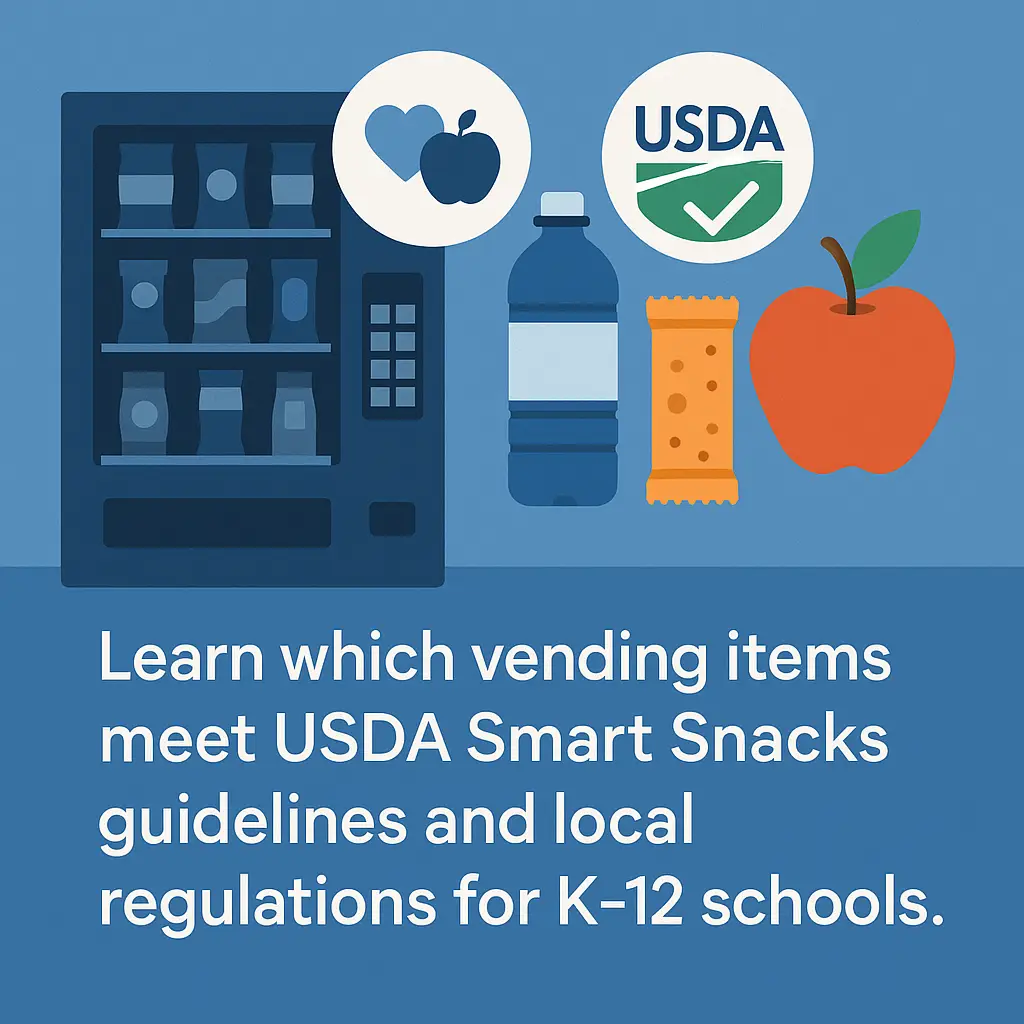School-Compliant Vending Options
Learn which vending items meet USDA Smart Snacks guidelines and local regulations for K–12 schools.
Back to Vending for Schools ResourcesLearn which vending items meet USDA Smart Snacks guidelines and local regulations for K–12 schools.
Back to Vending for Schools ResourcesSchools must verify that vending items meet USDA Smart Snacks in School standards and any state-specific health policies. This often includes working with vending partners who offer compliant product lists and can support audits or reviews.
![]() USDA Smart Snacks focus on whole grains and reduced sodium
USDA Smart Snacks focus on whole grains and reduced sodium
![]() Compliant vending improves student access to nutritious snacks
Compliant vending improves student access to nutritious snacks
![]() Schools must match vending plans with wellness policies
Schools must match vending plans with wellness policies

K–12 schools must follow strict nutritional standards when offering snacks and beverages in vending machines. The USDA’s Smart Snacks in School regulation outlines which products are allowed during school hours. These include items lower in sodium, sugar, and fat, while emphasizing whole grains, fruits, and dairy alternatives with low calories.
Smart Snack guidelines require that all snacks sold in schools contain no more than 200 calories per item, with limits on total fat, saturated fat, and sugar. Acceptable snacks often include granola bars, baked chips, string cheese, dried fruit packs, popcorn, and bottled water. When vending is located in middle or elementary schools, beverage restrictions get even stricter—only plain water and low-fat or fat-free milk are generally permitted.
School administrators and food service directors often struggle to align vending products with these regulations while still ensuring students like what's offered. That’s why many schools turn to vending providers experienced in serving educational environments. These vendors stock only Smart Snack-approved products, provide full nutritional labels when requested, and often support school wellness initiatives with healthy vending alternatives.
Technology also plays a role. Many school-friendly vending machines offer remote inventory tracking to ensure compliance and prevent the loading of unapproved snacks. Smart machines and controlled access times can further help schools regulate vending usage based on time-of-day rules.
For districts with strict local wellness policies, vending companies should be able to adjust product options to match state-level or district-specific rules. Flexibility, nutritional transparency, and proactive compliance support are critical when choosing a vendor for your school.
For an overview of how vending partnerships are screened and selected, read how vendor selection works in managed service programs. Offices and schools alike can benefit from the insights shared in our guide to popular vending machine formats, including dual snack and beverage options.
If you're exploring vending options for your business, Vending Exchange can help simplify the process. Delivery, Installation and Equipment is provided at no cost to you - vendors provide the machines, keep them stocked, and handle all servicing. Whether you need a provider or full-service management, just fill out the form on this page to get started.
Smart Snacks in School regulations limit calories, sugar, fat, and sodium in items sold to students during the school day.
Check product nutrition labels and ensure they meet Smart Snacks limits on calories, sugar, and saturated fat.
Yes, but they can only offer water, milk, or 100% juice, depending on state laws and school wellness policies.
Yes, compliant vending products can still sell well when machines are stocked based on student preferences and local tastes.
Reputable school vending providers offer full nutrition sheets and help schools meet wellness policy documentation needs.
Yes, smart vending machines can be programmed to restrict purchasing during designated meal hours.
Yes. District-level compliance is often monitored by wellness coordinators or school food service departments.
Water, low-fat milk, 100% juice, and drinks with ≤60 calories per 12 oz serving are allowed in high schools.
Most providers in the Vending Exchange network install within 7 days, assuming location requirements are met.
Yes, vending companies can swap out noncompliant products quickly to meet any newly updated school guidelines.